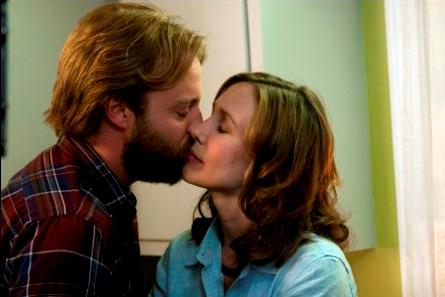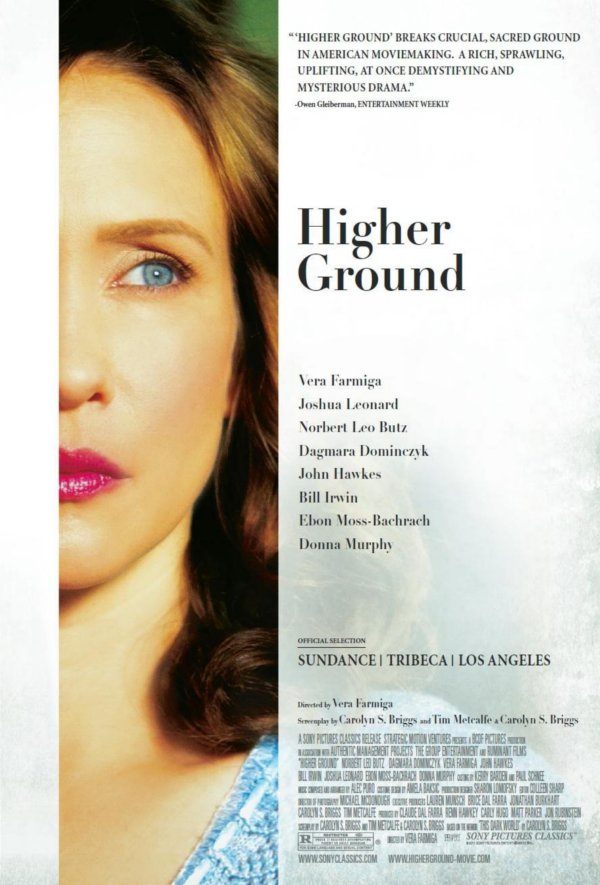
Choppy and meandering with plenty of needless scenes. Vera Farmiga’s Higher Ground is a confused exposé about a born-again hippie community of a devout Christian sect (which domination? I have no idea, and trust me, I saw the whole thing). Farmiga is a good proven actress in critically famed films like “The Departed (2006) and “Up in the Air” (2009), but she can’t direct worth a @#!*% . The early scenes are haywire non-linear storytelling – not artful, just disorganized. The car crash with pot smokers irritating a distracted driver is the first scene that hits you with true adrenaline, but the suspense and power is receded by slack editing and decidedly limp tension. I had no idea of the topography, where does it take place? I wondered with interminable impatience what jobs our main characters had, where does the money come from to support themselves? The first and second act of the movie is full of behavior but contains no depth – the characterizations are spotty. I was even unsure about what decade the film took place in for the longest time.
Those who read me regularly will know I like classy and mentally challenging art house and antique-ish pics like “The Help,” “Beautiful Boy,” “Project Nim,” “Tabloid,” “The Company Men,” “Midnight in Paris,” “Water for Elephants,” and the motherlode of masterpieces, “The Tree of Life.” I mention these as a taste buffer to my news to you that I think “Higher Ground” is awful, and I feel sorry for those involved, but it is a film that I don’t think will go anywhere. It reminds me of the unfortunate indie film slack that populated art house cinema in the early 2000’s (anybody remember “Scotland P.A.,” “The Chumscrubber,” “The Triumph of Love?” I think not).
Only by the second hour does the film develop some kind of base purpose. I counted it at about the 70 minute mark, a scene where there is a vocal friction between wife Farmiga and husband Joshua Leonard. What is said in the car is cruel and unreasonable. But Farmiga idolizes her character, and it seems that she thinks as a director we should fully sympathize with her, not fault her carelessness and misguidance. The husband’s actions in choking her was uncalled for and disloyal to God’s values, but that dramatic internal struggle isn’t exploited like it should. A session with a Reverend/Family-therapist begins with gripping power, but gosh darn it, even that is cut short before it reaches to any mighty revelation.
The final monologue contains strong words but the tension and dramatic heft is thinned and loses potency. The ending shot is so short-changing in a way that makes you want to blasphemy the film for the rest of the year. Will viewers be shoulder-shrugging or shouting at the screen, I wonder?
Then again, maybe this will find an audience in ultra-conservative Christian sects. They are the type of audience that goes for drama at a maudlin and coy level, stories with identifiable struggles that are plain and digestible enough to swallow, eyebrow raising but not too offensive. But they will have a hard time having the erotic toe-sucking scene explained to them (I liked that!), then again, maybe there’s something I don’t know and they might like that, too.
109 Minutes. Rated R.
DRAMA / RELIGION / BAD MOVIES WE HATE
Film Cousins: “The Last Temptation of Christ” (1988); “The Apostle” (1997); “Bringing Out the Dead” (1999); “Spring Summer Fall Winter… and Spring” (2003, South Korea).





